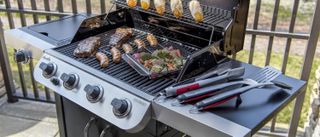The major disadvantage of natural gas grills is that you’ll need to have them installed in your home, which can be time consuming. Once it’s done though, your gas grill will burn cleaner and you’ll have an endless supply. By contrast, propane gas grills have the portability factor in their favor. Because propane tanks can be transported with the grill itself, you’ll never be constrained by propane gas. These tanks can run out after use, but you’ll find them easy to replace at many stores, and you can even fill up your empty tank. Despite that, there’s nothing worse than running out of gas mid-BBQ. It’s enough to put a dampener on any cookout, and barbecues with larger cooking areas can get through your propane gas, faster. We’ve weighed up the advantages and disadvantages of both, to help you choose between the two when buying your next grill. Of course, there are also the best infrared grills (opens in new tab) to consider, if you want to skip gas completely, but they offer a different cooking style and end-flavor.
Natural gas grills: What you need to know
Money in the Bank Getting natural gas installed in your home could potentially rack up a bill. Some services will install natural gas for free if your home is near a natural gas main. If you live far away from a natural gas main, there is a good chance you will have to pay a portion of the costs to have the main extended to your home. Upfront costs therefore could set you back a bit, but over the long haul you could be paying roughly a third for natural gas of what you pay to stay stocked up in propane. Going Green The fact is that natural gas and propane both have a small carbon footprint and are on the low end of the CO2 emissions fuel scale. They contribute less to global warming than any other fuels such as gasoline, kerosene and coal. With that said, natural gas burns even cleaner than propane, so if you had to give the green edge to one, it would be natural gas. But in terms of the environment, you can’t go too far wrong with either. The other popular fuel source for grills, charcoal, is much less energy efficient than natural gas or propane, and it produces far more pollutants than both of them. Convenience Setup is really the only complication, but once you are hooked up to natural gas you’re home free. No more running to the store to swap out propane tanks. Simply turn on your grill and enjoy an unlimited supply of fuel from your home’s natural gas source. Initial setup can be complicated, but there is a wealth of information online to help. Many gas grills offer a natural gas kit option that comes with a manual (often accompanied with an online video). This provides step-by-step instructions on how to hook it up. If you don t already have a gas line channeled to your back porch, contact your gas company to schedule a professional to do it for you. Unless you have the expertise to take on the job yourself, it’s probably not something you want to mess with.
Propane gas grills: What you need to know
Fuel Efficiency After having expounded on the virtues of natural gas, it may feel like there is little to be said in defense of propane, but the fact is many people prefer propane and there are good reasons why. Propane contains more energy than natural gas: propane contains 2,500 BTUs per cubic feet as compared to 1,000 BTUs for natural gas. Propane will give you all the heat you need, and then some, to cook your favorite BBQ dishes. For this and other reasons some feel propane is a purer barbecue experience. Easy to find While it’s embarrassing to run out of propane in the middle of a barbecue, most grills have a gauge that lets you know when you’re getting low, so it shouldn’t be a problem. Propane is readily available at supermarkets and convenience stores alike, so even if you forget to monitor your supply and run out, it’s only a temporary inconvenience. In some areas you might even have a propane guy who comes around regularly to fill up your tanks - hardly an inconvenience at all. Portable power If you’re barbecuing at a remote cabin in a mountain retreat, you probably don’t need to be told to have a couple backup tanks on hand to avoid running out. Speaking of remote locations, it’s nice having the option of propane since there are some locations where connecting to a natural gas main would be next to impossible. So whether you decide to convert over to a natural gas grill or stick to propane, there are advantages to both and you won’t go too far wrong with either option. If you go the natural gas route, the savings, environmental advantages and overall convenience more than make up for the initial headaches of putting all the pieces in place.
